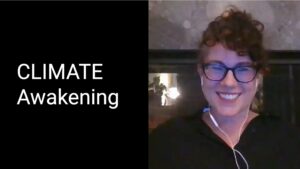CLIMATE Awakening: Conversations with Dr Rebecca Huntley
In this episode of Let’s Climunicate, Dr. Alberto Troccoli sits down with Dr. Rebecca Huntley – renowned Australian social researcher and author – to explore what shapes public attitudes toward climate change and what inspires people to act. What unfolds is a rich and practical conversation about emotional triggers, audience segmentation, communication strategies, and why hope—when backed by action—remains our most powerful tool.
From Concern to Activism
Rebecca Huntley’s climate “awakening” was sparked not by data, but by emotion. Watching young people take to the streets during the school strikes—and thinking of her own children—reframed the urgency of climate change in her life. This personal moment pushed her from passive concern to active advocacy.
She notes that these turning points are often deeply personal: the birth of a grandchild, the trauma of a bushfire, or the loss of a familiar place. These emotional catalysts move climate change from the abstract into the personal—and from the background into the spotlight.
Why Science Isn’t Enough
Despite overwhelming scientific consensus, public perception remains uneven. Huntley stresses that outright denial is rare—only about 10% of Australians fall into the “Dismissive” category—but many others are unsure, disengaged, or overwhelmed.
Misinformation from fossil fuel interests adds confusion, but Huntley is clear: lecturing people with facts isn’t enough. Instead, she encourages communicators to focus on what matters to individuals—emphasising solutions, values, and tangible benefits. Meeting people where they are is more effective than demanding they come to where science is.
The Climate Compass: Seven Segments, Many Strategies
Huntley explains the Climate Compass, a framework that categorises the population into seven audience segments—from “Alarmed” to “Dismissive.” Effective communication requires tailoring messages to these groups:
- Cautious individuals might respond to cost-saving opportunities or job creation
- Alarmed individuals tend to prioritise health, justice, and environmental concerns
- Doubtful audiences are more likely to trust relatable voices like farmers or tradespeople
Messaging that misaligns with people’s values risks alienating them. The Climate Compass helps ensure that climate communication is strategic, not one-size-fits-all.
Breaking the Climate Silence
One of Huntley’s most powerful calls to action is simple: start talking about climate change. Many Australians overestimate climate scepticism in their communities. This misperception creates a silence that reinforces itself.
Normalising everyday conversations—at work, in schools, or around the dinner table—can break this silence and build shared understanding.
From casually discussing electric vehicles to supporting community solar initiatives, small conversations can change minds. Huntley also underscores the importance of self-education—on both the climate science and the innovative solutions emerging every day. The combination of knowledge and dialogue fosters hope, agency, and action.
Looking Forward: From Fatalism to Active Hope
While she doesn’t shy away from the scale of the challenge, Huntley is hopeful—particularly about younger generations. With over 60% of Australians under 30 identifying as “Alarmed,” the demographics are shifting.
She envisions an Australia where renewables dominate the energy mix, and where climate impacts are addressed not just with policy, but with resilience and community strength. Her core message is clear:
“We don’t need everyone to fully believe the science—we just need them to participate in the solutions.”
Rebecca Huntley’s insights remind us that climate change is not just a scientific issue—it’s a human one. Change happens when we speak, when we listen, and when we connect. By understanding personal motivations, crafting messages that resonate, and taking action—however small—we can each contribute to building a liveable, hopeful future.




